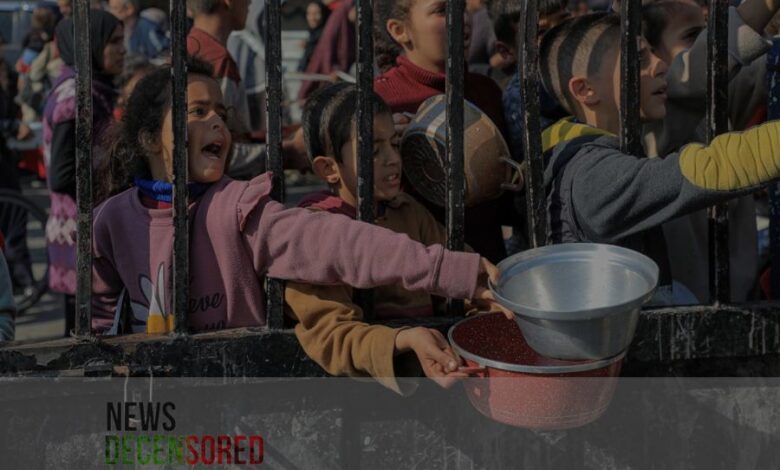What is the fate of hungry children in the Gaza Strip?

“What will happen to the hungry children? Will they find help? Or will hunger destroy them? My son Ali is already dead,” asked a distressed father.
The infant Ali died of malnutrition and dehydration in the only children’s hospital operating in the northern Gaza Strip – Kamal Adwan Hospital.
The father appealed to health workers to provide relief to other children receiving treatment in the same hospital, as the United Nations warns of famine if the arrival of relief aid does not significantly increase to the “afflicted” Gaza Strip.
The father, who refused to reveal his name, spoke to the media, saying: “Ali was born after the outbreak of war, and there was no food or anything for his mother to feed on – which caused the baby
to suffer kidney failure” as a result of malnutrition.
He added: “Ali’s health conditions were getting worse day after day. We tried to treat him in hospitals, but we could not find anything to help him with… The baby died in full view of the whole world, without anyone doing anything.”
A World Health Organization team that recently visited the Gaza Strip said that baby Ali was not the only one who died of hunger in Kamal Adwan Hospital in the city of Beit Lahia, but was among at least ten other children.
The Ministry of Health in Gaza said that at least 18 children died from malnutrition and dehydration throughout the Strip during the last week, noting that 15 of these children were receiving treatment at
Kamal Adwan Hospital. The Ministry also expressed its fear for six other infants suffering from malnutrition in the same hospital.
The United Nations Children’s Fund, UNICEF, warned of an expected rapid increase in the number of children dying of hunger unless the war between Israel and Hamas ends, and unless obstacles to humanitarian relief are removed immediately.
The Ministry of Health in Gaza says that children and women represent 70 percent of the number of people killed in this war, whose number exceeded 30,700 people, and of the number of injured exceeded the barrier of 72,000.
Israel began an air and ground military operation in the Gaza Strip, after Hamas carried out attacks against Israel on October 7, in which about 1,200 people were killed, while another 253 people were
taken hostage, according to the Israeli authorities.
Currently, about 300,000 people live under siege in northern Gaza, while the World Food Program says that hunger has reached catastrophic levels due to the scarcity of aid.
Ground survey conducted by United Nations organizations in January revealed that one in six children under the age of two years suffer from severe malnutrition and need urgent treatment.
In addition to exhaustion and trauma, the war caused a shortage of nutritious foods, which in turn caused mothers to be unable to breastfeed their babies.
In the absence of breast milk and formula, infants become easy prey for dehydration and malnutrition, which causes diseases such as kidney failure, which in turn pose a threat to life.
In an interview on local Radio, Dr. Samia Abdel Jalil from Kamal Adwan Hospital said that an infant girl and her older sister died in the hospital within a few days.
The doctor added: “The baby died without receiving a small dose of milk. We are facing difficulty in providing milk for all infants.”
In Kamal Adwan Hospital, Salah Samara, a four-month-old baby, is suffering, along with other children, in light of the hospital’s scarcity of resources.
Salah’s mother says she was born prematurely (less than 28 weeks pregnant) and then suffered from severe dehydration before suffering from chronic kidney disease, as well as urinary retention – conditions that cause severe pain.
The mother added, “My heart is writhing in pain because of what is happening to him… What an extremely difficult thing it is to see your child screaming every day because he cannot urinate, while the
doctors are unable to help him.”
The mother continues: “He has the right to receive treatment and he has the right to everything else, because he is a child at the beginning of his life.”
Meanwhile, Ahmed Al-Kahlot, director of Kamal Adwan Hospital, warned that the number of child deaths so far, which Ministry of Health statistics indicate, limits the true scale of the problem.
Via the X website, Director-General of the World Health Organization, Tedros Adhanom Ghebreyesus, confirmed that the organization was able to deliver fuel and some basic medical supplies to Kamal Adwan Hospital and another hospital (Al-Awda Hospital in Jabalia Camp), where a team recently visited them.
But at the same time, Ghebreyesus warned that the aid that arrived represented only a small part of the urgent relief needs.
Ghebreyesus appealed to Israel to “ensure regular access of humanitarian aid to civilians, especially children, who need an immediate increase in the volume of aid, but the basic medicine that all these sick people need is peace.”




